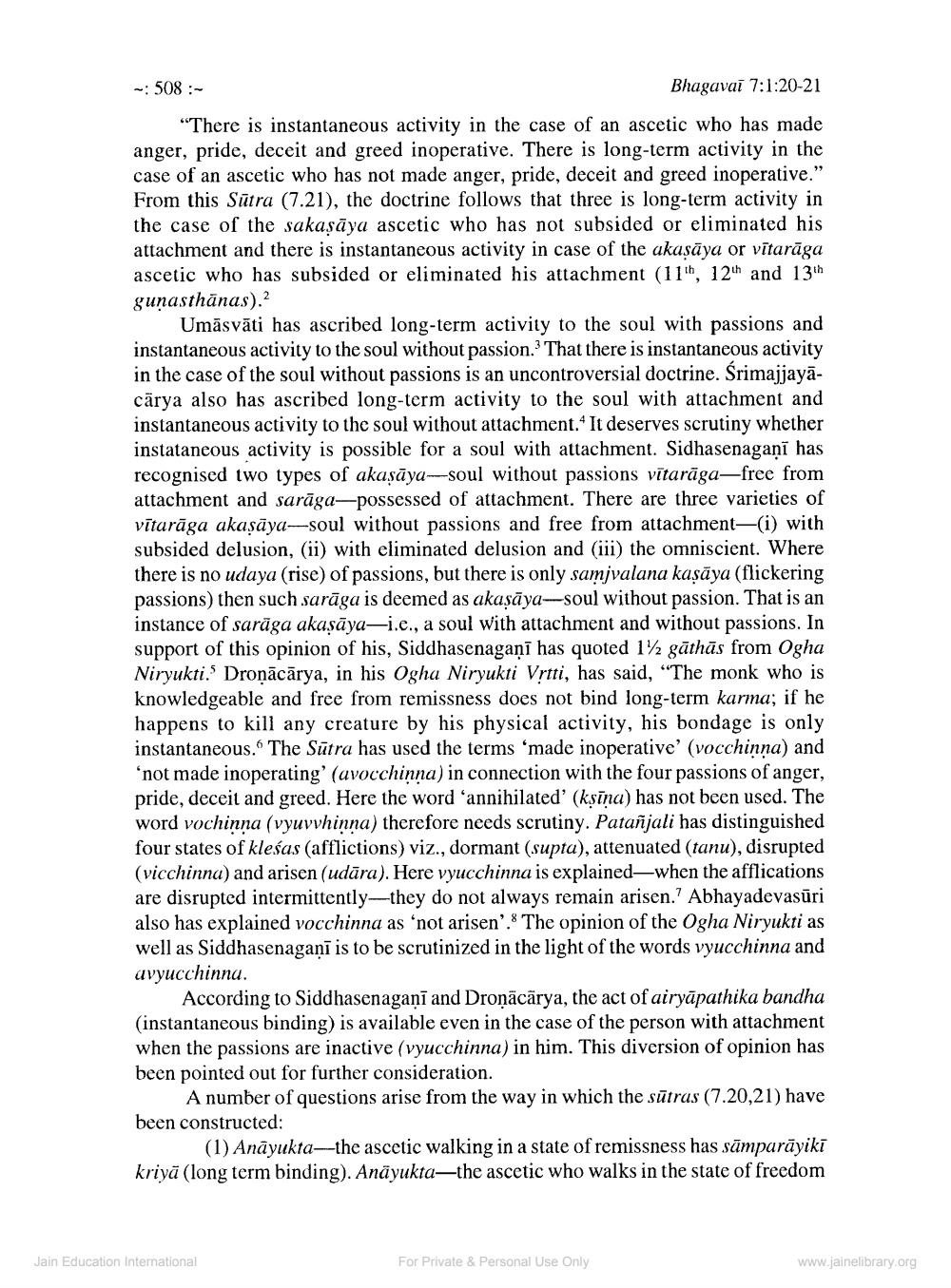________________
-: 508 :
Bhagavai 7:1:20-21
"There is instantaneous activity in the case of an ascetic who has made anger, pride, deceit and greed inoperative. There is long-term activity in the case of an ascetic who has not made anger, pride, deceit and greed inoperative." From this Sūtra (7.21), the doctrine follows that three is long-term activity in the case of the sakasāya ascetic who has not subsided or eliminated his attachment and there is instantaneous activity in case of the akaṣāya or vītarāga ascetic who has subsided or eliminated his attachment (11h, 12th and 13th gunasthānas).
Umāsvāti has ascribed long-term activity to the soul with passions and instantaneous activity to the soul without passion." That there is instantaneous activity in the case of the soul without passions is an uncontroversial doctrine. Srimajjayācārya also has ascribed long-term activity to the soul with attachment and instantaneous activity to the soul without attachment. It deserves scrutiny whether instataneous activity is possible for a soul with attachment. Sidhasenagaội has recognised two types of akaṣāya---soul without passions vītarāga—free from attachment and sarāga—possessed of attachment. There are three varieties of vītarāga akaṣāya---soul without passions and free from attachment-(i) with subsided delusion, (ii) with eliminated delusion and (iii) the omniscient. Where there is no udaya (rise) of passions, but there is only samjvalana kasāya (flickering passions) then such sarāga is deemed as akasāya--soul without passion. That is an instance of sarāga akaṣāya-i.c., a soul with attachment and without passions. In support of this opinion of his, Siddhasenagani has quoted 122 gāthās from Ogha Niryukti. Dronācārya, in his Ogha Niryukti Vrtti, has said, "The monk who is knowledgeable and free from remissness does not bind long-term karma; if he happens to kill any creature by his physical activity, his bondage is only instantaneous. The Sūtra has used the terms 'made inoperative' (vocchinna) and *not made inoperating' (avocchinna) in connection with the four passions of anger, pride, deceit and greed. Here the word 'annihilated' (kṣīna) has not been used. The word vochinna (vyuvvhinna) therefore needs scrutiny. Patañjali has distinguished four states of klešas (afflictions) viz., dormant (supta), attenuated (tanu), disrupted (vicchinna) and arisen (udāra). Here vyucchinna is explained—when the afflications are disrupted intermittently—they do not always remain arisen.? Abhayadevasūri also has explained vocchinna as 'not arisen'. The opinion of the Ogha Niryukti as well as Siddhasenaganī is to be scrutinized in the light of the words vyucchinna and avyucchinna.
According to Siddhasenaganī and Droņācārya, the act of airyāpathika bandha (instantaneous binding) is available even in the case of the person with attachment when the passions are inactive (vyucchinna) in him. This diversion of opinion has been pointed out for further consideration.
A number of questions arise from the way in which the sūtrus (7.20,21) have been constructed:
(1) Anāyukta--the ascetic walking in a state of remissness has sāmparāyiki kriyā (long term binding). Anäyukta—the ascetic who walks in the state of freedom
Jain Education International
For Private & Personal Use Only
www.jainelibrary.org




